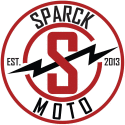I guess most of what your saying could be true in theory, however in practice there are multiple advantages to drilling/slotting rotors, drilling and slotting decreases weight which decreases un-sprung weight and helps tyres/suspension function
On a street bike, slotting is more effective for water dispersion, holes tend to steam up and create a boundary layer although it is still an improvement over solid discs (or so I've read from people who experiment with these things)
None are hardened after being made, they work/age harden naturally
The only rotors I've ever seen crack were used for racing, guy kept using them as he said the cracks helped braking rotors no longer distorted when overheated (TL1000R motor in a 'Legends' type car using Honda street discs thinned to 5mm

)
I drilled oversize holes in my XS rotors about 8 ~9 yrs ago, they are in better condition now than they were when I did them (I would have used 1/4"~6mm if I was staying with single disc but I upgraded to dual and fitted Suzuki 4 pot calipers)
Yamaha rotors/pads are 'famous' for getting material embedded and tearing up rotor, the holes allow even pad/rotor wear and IS better than stock (at least with dual discs)
Using stock single disc rotors also means I have larger diameter than the genuine Yamaha dual disc rotors (298mm vs 275mm)
I've also drilled a lot of Honda rotors without any issues.
One thing you do need to check or work to be effective, the 'edges' of the holes have to 'overlap' slightly or wear ridges will develop where rotor is in effect still 'solid'





